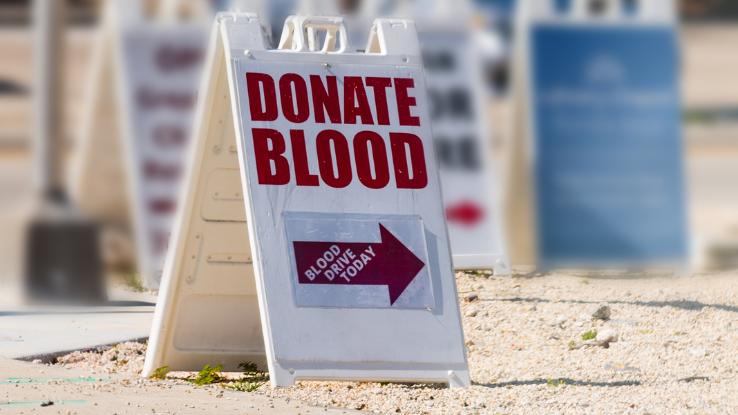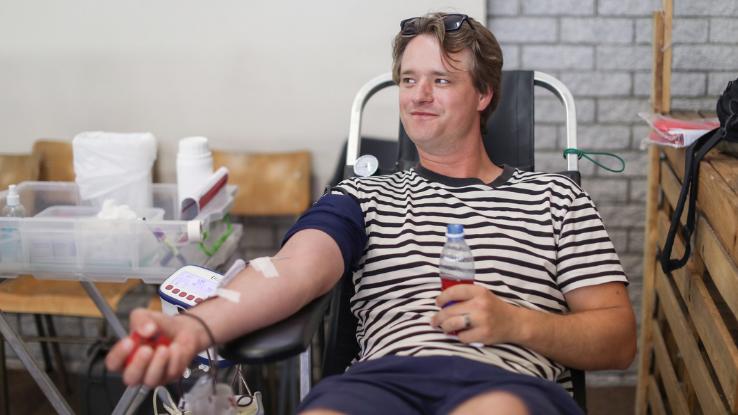What Is Donated Blood Used For

According to the American Red Cantankerous, only 1 in 100 people donates blood — even though the demand for blood is constant. "Many people are reluctant to make their starting time blood donation," the Red Cross notes, "simply one time they exercise, they find the donation process to exist easy and gratifying." In fact, i donation tin can help save up to three lives. However, if you lot're thinking of donating claret — for the first fourth dimension or the hundredth — it's essential that yous learn more about the requirements and restrictions first. In observance of National Blood Donor Calendar month, we'll tell you everything you lot demand to know before your first visit.
To be a claret donor, there are specific requirements that must be met, including the following:
- You must be at least 17 years former. (Note: Some states allow 16 year olds to donate claret.)
- You must counterbalance at least 110 pounds.
- You lot must feel well enough to give blood.
- If y'all are 18 years old or younger, y'all must meet certain peak and weight requirements.

Even if you lot run into all of these requirements, you may still be ineligible for blood donation, either permanently or temporarily. It's too important to annotation that if you want to donate more once, or become a repeat donor, you must expect at to the lowest degree eight weeks between blood donations.
Restrictions Associated With Being a Blood Donor
While all claret is tested after it is donated, sure types of leaner or viruses may not evidence up in the examination results, which is why it's important to have stock of your own weather condition, illnesses and medications earlier giving claret. If you have the following diseases or atmospheric condition, you are ineligible:
- Sickle jail cell affliction
- Chronic fatigue syndrome
- Hepatitis B or hepatitis C
- Blood cancer
- Tuberculosis
- Hemochromatosis
- HIV or AIDS, or if yous are at run a risk for developing HIV

Other restrictions include, but are non limited to:
- If y'all've e'er taken IV drugs that were non prescribed to you.
- If you or a first-degree relative suffers from Creutzfeldt-Jakob Disease.
- If you accept had unexplained jaundice since the age of 11.
- If you have ever received a dura mater transplant or accept taken homo pituitary growth hormone.
- If yous were built-in in and/or lived in certain countries of West Africa.
- If you lot've spent a pregnant amount of time in countries where mad cow illness is found.
- If you have diabetes and accept ever taken bovine insulin made from cows from the Britain.
- If yous have ever received a blood transplant in the United Kingdom or Africa.
Even if none of the to a higher place applies to you, yous may still exist turned away from the blood bank. Here are some of the conditions that may make you temporarily ineligible:
- If you have an astute infection, you must wait until it clears up and off antibiotics.
- If you've received a tattoo from a non-land regulated facility, or a piercing with not-sterile instruments. In that example, you must wait 12 months to donate.
- If you've been treated for syphilis or gonorrhea or have had sexual contact with someone who has hepatitis. In that example, you also must wait 12 months to donate.
- If you've been incarcerated for more iii days, you lot must look 12 months after your release to donate.
- If you've had an organ/tissue transplant or had a claret transfusion that used another person's blood, you must await 12 months to donate.
- If you have had a heart attack, angina, angioplasty, or bypass surgery, y'all must wait vi months.
- If yous've traveled to Iraq, or have traveled to or lived in countries where malaria is plant. In that case, you lot must look 12 months before being eligible to donate.
- If you are meaning, you must look until vi months after you give birth.
- If y'all've had certain immunizations or vaccinations, you may have to wait three to eight weeks to donate, depending on what type of shots you've had. Consult with your dr. or the claret banking concern before altruistic.
Although having to wait tin can exist frustrating, it is the best way to protect yourself and others. And in one case that waiting period is over, you'll be eligible to donate fourth dimension and time again.
What to Look When Donating Blood
If you run across the requirements, you lot can technically donate blood — simply it'south important to exist aware of the process and what to expect from the process. It can be an uneasy experience for some, specially if y'all're scared of needles or feel queasy at the sight of blood. Needless to say, existence prepared is the all-time way to feel comfortable and confident about donation.
Before yous give blood, consider the post-obit:
- Drink plenty of fluids.
- Eat a depression-fatty, high-fe diet.
- Become a skilful nighttime's sleep.
- Make certain you accept your ID ready.
- Vesture a brusk-sleeve shirt or a shirt with sleeves that roll-up easily.
- Make a listing of medications that may be in your system.

The process of getting your claret drawn may seem daunting, but it'due south actually rather straightforward. The steps, as outlined by the Ruby Cross, are every bit follows:
- Registration: Here'due south where having your ID comes in handy. Before the actual donation starts, you'll need to evidence an ID to annals. At this point, staff will go over donation information with you.
- Health History & Mini-Physical: You'll be asked some questions well-nigh your health and medical history; staff volition besides want to know what medications you have and where you've traveled. Additionally, they'll cheque your pulse, blood pressure, temperature and hemoglobin level.
- Donation: An area on your arm volition be cleaned, once a nurse finds a good vein, a sterile needle will be inserted into your arm. The whole process takes 10 minutes at the nigh, and they'll draw roughly i pint of blood from you for the donation.
- Refreshments: After donating, you lot're invited to the refreshment area, where you can accept a snack and something to beverage. Be sure to sit down a moment, too. A lot of folks experience lightheaded, slightly sick to their stomach, or drawn later.
- Aftercare: Don't exert yourself. For the rest of the twenty-four hours, be sure to residual and stay properly hydrated and nourished.
Recall that donating claret tin can exist a positive experience. Afterward, you lot'll experience good knowing that yous've helped someone in need.
Resource Links:
- "Blood Donation and Collection" via Blood Banking and Transfusion Medicine, U.S. National Library of Medicine
- "Claret Donor Selection: Guidelines on Assessing Donor Suitability for Blood Donation" via U.S. National Library of Medicine
- "Associations of health status with subsequent blood donor beliefs—An alternative perspective on the Healthy Donor Result from Donor InSight" via U.S. National Library of Medicine
- "Claret Donation" via National Center for Biotechnology Information (NCBI)
- "Blood Donor Option: Guidelines on Assessing Donor Suitability for Blood Donation" via National Center for Biotechnology Information (NCBI)
- "Blood Donor Counselling: Implementation Guidelines" via National Middle for Biotechnology Information (NCBI)
What Is Donated Blood Used For,
Source: https://www.symptomfind.com/healthy-living/blood-donation-requirements-and-restrictions-be-aware?utm_content=params%3Ao%3D740013%26ad%3DdirN%26qo%3DserpIndex
Posted by: stanfordsulthen01.blogspot.com


0 Response to "What Is Donated Blood Used For"
Post a Comment